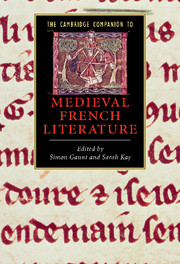Book contents
- Frontmatter
- Introduction
- Part I What is a Medieval French Text?
- 1 The Chanson de Roland
- 2 The Old French Vulgate cycle
- 3 Le Roman de la rose
- 4 The Testament of François Villon
- Part II What is a Medieval French Author?
- Part III What is the Value of Genre for Medieval French Literature?
- Part IV How can we read Medieval French Literature Historically?
- Appendix: Reference works for Old and Middle French
- Bibliography of medieval French texts
- Suggested Further Reading
- Index
- Series List
1 - The Chanson de Roland
from Part I - What is a Medieval French Text?
Published online by Cambridge University Press: 28 March 2009
- Frontmatter
- Introduction
- Part I What is a Medieval French Text?
- 1 The Chanson de Roland
- 2 The Old French Vulgate cycle
- 3 Le Roman de la rose
- 4 The Testament of François Villon
- Part II What is a Medieval French Author?
- Part III What is the Value of Genre for Medieval French Literature?
- Part IV How can we read Medieval French Literature Historically?
- Appendix: Reference works for Old and Middle French
- Bibliography of medieval French texts
- Suggested Further Reading
- Index
- Series List
Summary
The Song of Roland functions as what Pierre Nora terms a lieu de mémoire: 'any significant entity, whether material or non-material in nature, which by dint of human will or the work of time has become a symbolic element of the memorial heritage of any community (in this case, the French community)'. Nineteenth-century antiquarians seeking a national epic which would be to France what the Iliad was to Greece - at once a glorious military legend, an exposition of core ethical values and a great literary production from its finest political and cultural moment - directed their energies to discovering a Song of Roland. Since then the Roland has been invoked in wartime to symbolize and galvanize French resistance; during the siege of Paris in 1870 the great medievalist Gaston Paris lectured at the Collège de France on 'La Chanson de Roland et la nationalité française', and Raoul Mortier published clandestinely all the extant French Roland versions under the Occupation in 1940-4. Even to those who have not read it, the Roland epitomizes 'une certaine idée de la France', the evocative phrase with which de Gaulle characterized the roots of his political outlook and which has been borrowed ever since (not always without irony) to express patriotic attachment to a romantic conception of France. The poem’s heroes - combative, passionate, pious, unwavering in their commitment to France dulce, la bele - personify virtues foundational to French collective identity. Histories of French literature devote substantial attention to the Roland, and studies of medieval French (including the present volume) give pride of place to what is generally considered the first masterpiece in the French tongue and foundation stone of the world’s foremost tradition of belles-lettres.
- Type
- Chapter
- Information
- The Cambridge Companion to Medieval French Literature , pp. 21 - 34Publisher: Cambridge University PressPrint publication year: 2008
- 2
- Cited by



